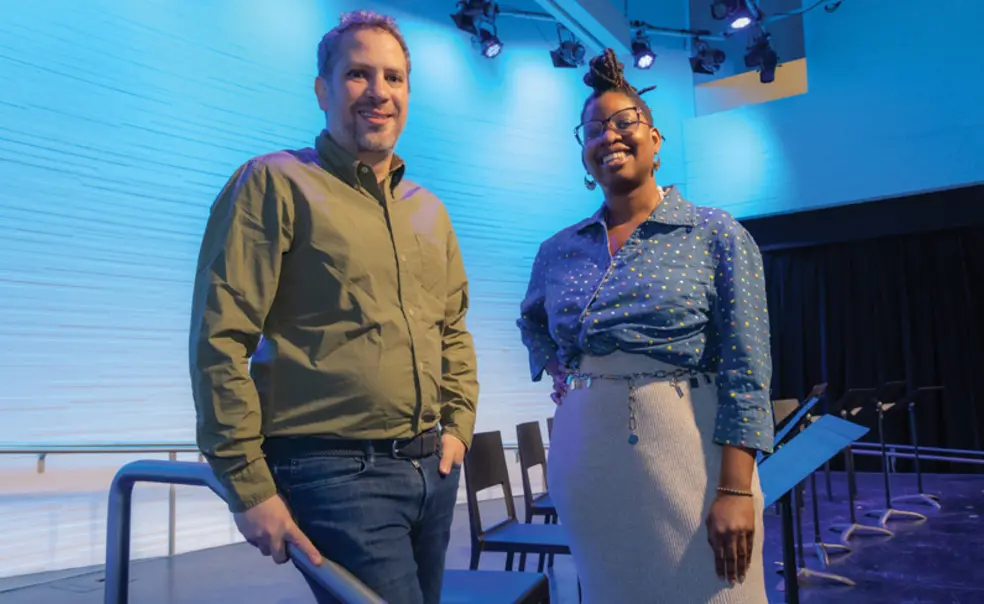Storytelling Project Enlists Theater in Fight Against Climate Change
Two years ago, Princeton University announced The Next Forever, an effort to tackle climate change by combining professional theater with the sciences and arts on campus. This spring, the first two public events of the three-year pilot project took place in Princeton.
The joint effort by the Lewis Center for the Arts, the High Meadows Environmental Institute (HMEI), and New York City-based theater company The Civilians aims to bring artists and hard and social scientists together to produce effective yet digestible environmental storytelling. Its name comes from a quote by a former Canadian mayor who said society will be dealing with climate change for “the next forever.”
As environmental research comes under attack, “creative storytelling … will continue to be important … for expanding human understanding and connection to environmental themes/issues,” HMEI Executive Director Katharine Hackett ’79 told PAW via email.
Marion Friedman Young ’00, executive director of the Lewis Center, added, “In the midst of cuts across the board within the sciences and humanities, finding bridges between the two, which I think this program does so well, also feels incredibly important.”
“When I pitched this project, I was like, ‘This is one of my crazier ideas.’ So, I am grateful for the investment and the risk-taking.”
— AriDy Nox
2023-24 artist-in-residence
The Next Forever launched in June 2023, but the roots date back to 2009-10, when playwright Steve Cosson and the late composer Michael Friedman, both of whom were with The Civilians, came to what is now HMEI as Barron Visiting Professors in the environment and the humanities. Their environmentally themed musical, The Great Immensity, which has a song titled “The Next Forever,” premiered in Princeton in 2009 and later ran in New York.
“We saw the potential. We saw the excitement. We saw what [The Great Immensity] brought to campus,” said Hackett. But those involved also realized “we could take it further.”
Cosson, now a visiting lecturer in theater and artistic director of The Civilians, is carrying forward what he and Friedman, who died in 2017, started. He works in tandem with Hackett and Friedman’s sister, Young, who previously was managing director of The Civilians.
“Personally, that I get to bring my brother’s voice back into the room … to call back his memory is a very nice, unique thing,” said Young. “He’d really like that we’re doing this.”
Since the summer of 2023, two “theater makers,” in the University’s words, per year have been awarded commissions for original environmentally focused works; they also spend time on campus as artists-in-residence.
AriDy Nox, one of the first two artists selected, told PAW their two weeks at Princeton greatly influenced their work, Why Y’all Hate Earth So Bad? HMEI arranged conversations with environmental experts on campus, and those interactions led to more interviews with students, postdocs, and faculty, according to Nox. After every interview, their work evolved.
Nox also attended University events and said one breakthrough occurred after they saw a poster for a talk on participatory design, a topic that looked “vaguely related,” which ended up becoming “so baked into the piece.”
On April 21, Nox and Kareem Fahmy, the other 2023-24 artist-in-residence, spoke about their progress at a public presentation.
Rather than a staged production, Nox expects their end product will be a guidebook on how to organize hyper-locally focused workshops that ask attendees to imagine themselves as ancestors who must explain the state of the world to their future descendants. Nox hopes scientific experts will be included in each session.
“When I pitched this project, I was like, ‘This is one of my crazier ideas,’” Nox told PAW of The Next Forever commission. “So, I am grateful for the investment and the risk-taking.”
“I didn’t just want to do the thing I could do without a commission; I wanted to do something that’s very ambitious,” Fahmy said at the event.
Eight actors read about 40 minutes of Fahmy’s 140-page, fully drafted play, Riparian Rights, about water scarcity around the Nile River. He plans to continue researching and rewriting.
Nox, Fahmy, and the 2024-25 artists-in-residence — Kate Tarker and Kate Douglas — have also been guest speakers for an environmental storytelling course co-taught by Cosson that tasks students with writing environmental works.
Collin Guedel ’26, a geosciences major who took the class when it was first offered in spring 2024, told PAW at the time that one of the biggest challenges is to “get people inspired to action, hoping your audience listens and feels like they can do something, while also … not making it a blame game” of individuals.
“These are complicated, and in many ways, threatening topics,” said Hackett.
Earlier in April, McCarter Theatre held a workshop for The Gulf, a play Cosson is writing using verbatim quotes from interviews he conducted with people affected by industrial pollution. Afterward, Cosson and Eric Tate, a professor of public affairs at the School of Public and International Affairs who studies water resources and disasters, discussed climate change and The Next Forever.
“Scientific terms … don’t resonate,” Tate said. “This is why I think art is, storytelling is, so critical.”












No responses yet